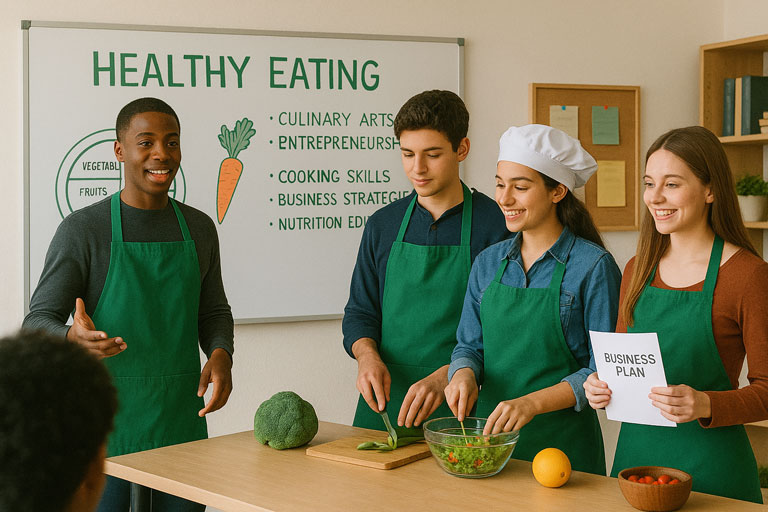“Cooking Up Health, Community & Opportunity”
Foodpreneurs blends culinary arts, entrepreneurship, and health by guiding youth and adults through real-world food industry projects. Participants move through six phases: identifying food interests and cultural roots, exploring food systems, applying research on ingredients and nutrition, building recipes and budgets, launching a food business, and presenting at a live event like a pop-up café or market. This model cultivates creativity, business skills, and healthy habits through hands-on exploration and community sharing.
Goal
To equip participants with culinary skills, entrepreneurial mindset, and health knowledge, empowering them to create, market, and sell food-based projects while understanding nutrition and business fundamentals.
Skill Objectives
Participants will improve the following skills:
- Problem-solving skills – the ability to solve challenges in nutrition, cooking, and food-based entrepreneurship
- Research skills – the ability to explore culinary trends, healthy eating practices, and food industry opportunities
- Management skills – the ability to organize menus, budgets, and business plans for food-related ventures
Outcomes
- Enhanced understanding of nutrition and culinary techniques
- Practical entrepreneurial skills: budgeting, sourcing, marketing
- Strengthened communication and presentation abilities
- Successful completion of a culinary product and business pitch or event
Benefits
- Hands-on culinary entrepreneurship strengthens cooking self-efficacy, healthier eating behaviors, and STEM-related engagement—especially for youth of color. Afterschool CHEF Bites programs improved vegetable intake, nutrition knowledge, and culinary skills in predominantly Hispanic/Latino communities (Schmidt et al., 2022).
- The TX Sprouts gardening + cooking curriculum led to significant increases in vegetable consumption and dietary quality among low-income students, many of whom were Hispanic or Black (Landry et al., 2021).
- Education-based cooking and gardening trials consistently show stronger dietary improvements in underserved youth populations (Jeans et al., 2023).
References
- Schmidt, S., Goros, S., Gelfond, L., Bowen, A., Guttersen, M., Messbarger‑Eguia, L., Feldmann, J., & Ramirez, G. (2022). Children’s Afterschool Culinary Education Improves Eating Behaviors. Frontiers in Public Health, 10, 719015. https://pubmed.ncbi.nlm.nih.gov/35570900/
- Landry, M. J., van den Berg, A. E., Hoelscher, D. M., Asigbee, F. M., Vandyousefi, S., Ghaddar, R., Jeans, M. R., Waugh, L., Nikah, K., Sharma, S. V., & Davis, J. N. (2021). Impact of a school-based gardening, cooking, nutrition intervention on diet intake and quality: The TX Sprouts randomized controlled trial. Nutrients, 13(9), 3081. https://doi.org/10.3390/nu13093081
- Jeans, M. R., Landry, M. J., Vandyousefi, S., Hudson, E. A., Burgermaster, M., Bray, M. S., Chandra, J., & Davis, J. N. (2023). Effects of a school-based gardening, cooking, and nutrition cluster randomized controlled trial on unprocessed and ultra-processed food consumption. Journal of Nutrition, 153(7), 2073–2084. https://doi.org/10.1016/j.tjnut.2023.04.013





